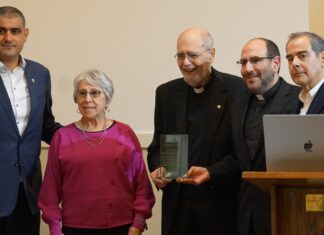Resorting to falsifications and to distortions seems to have become standard behavior for the Turkish government. Despite overwhelming documentation, Turkey continues to deny the 1915-1919 Genocide of Armenians perpetrated at the hands of the Ottoman Empire. An estimated one and a half million Armenians were forcibly removed from their homes and marched into the desert to starve or to be slaughtered at destination. “Armenians should have learned their lesson,” Turkish leaders affirm. Yet, as the late Edmond Yervant Azadian so poignantly points out in his editorial in the April 24, 2021 issue of the Armenian Mirror-Spectator, how could Armenians “have learned their lesson” when the Turkish government claims that “we committed no genocide?”
The threats of new genocides continue, with even more arrogance. On September 19, 2023, Azerbaijan, with the backing of Turkey, launched a military offensive against the territories of the Republic of Artsakh (Nagorno-Karabakh). 120,000 indigenous Armenians were expelled from the land they have been living on for millennia. The lightning attack followed a nine-month blockade of the Lachin corridor, the only passageway connecting the Republic of Artsakh to the Republic of Armenia. Water supplies and electricity were cut. Trucks loaded with food, medicine and other basic necessities were denied access. The blockade was clearly an attempt at death by starvation and suffocation.
In just three days an entire population had been ethnically cleansed, while the world watched in indifference. There were some warnings, to be sure, but no action was taken. More shocking than the horrendous act — Genocide is a criminal offense as defined by the International Court of Human Rights — and the indifference of the world is the one-sidedness of the powers that could have intervened in the name of “human dignity” and prevented this second genocide of the Armenian people. Referring to the return home of the more than two million Syrians who were displaced as a result of the over-a-decade long civil war in Syria and had found refuge in Lebanon, a U. S. State Department Spokesperson affirms: “We are opposed to any imposed repatriation that does not take into consideration the human dignity of the citizens” (italics mine). Nevertheless, without the least “consideration [of their] human dignity,” 120,000 indigenous Armenians were uprooted from their ancestral lands and forced to relocate.
Much has been written, and rightly so, about the Armenian government needing to take responsibility for being unprepared militarily, our leaders being more preoccupied with their careers and self-interest than the good of their country. That fact, however, does in no way condone the inaction of the world that enabled the mass exodus of an entire population that was forced to flee leaving behind houses, gardens, livestock, and so much more. The vision of the shepherd who, one afternoon in the summer of 2014, gently waved his rod to stop the car traffic on a village road in Artsakh, so his flock of sheep could cross to safety, will never cease to haunt me.
Oppressing, dominating, occupying seems to have become an obsession with those in power. Brutal force is flaunted shamelessly while ethical and moral values are derided. Azerbaijani President Ilham Aliyev has signaled that Baku would use force to seize the Zangezur corridor to link Azerbaijan and Turkey, “whether Armenia wants it or not.” The arrogance and the impudence of his words recall Talaat Pasha’s infamous, “We will leave behind one Armenian, and that in a museum.”
Indeed, emboldened by their recent victory and the dissolution of the Republic of Artsakh, the Azeris have been carrying on the barbarity and the vandalism with more disrespect than ever. Former and current Karabakh officials are arrested. The egregious lie that the inscriptions on the 13th century monasteries of Dadivank and Gandzasar, quintessential symbols of our architecture and of our identity as Armenians, have been “restored to their original appearance” is downright nauseating.









